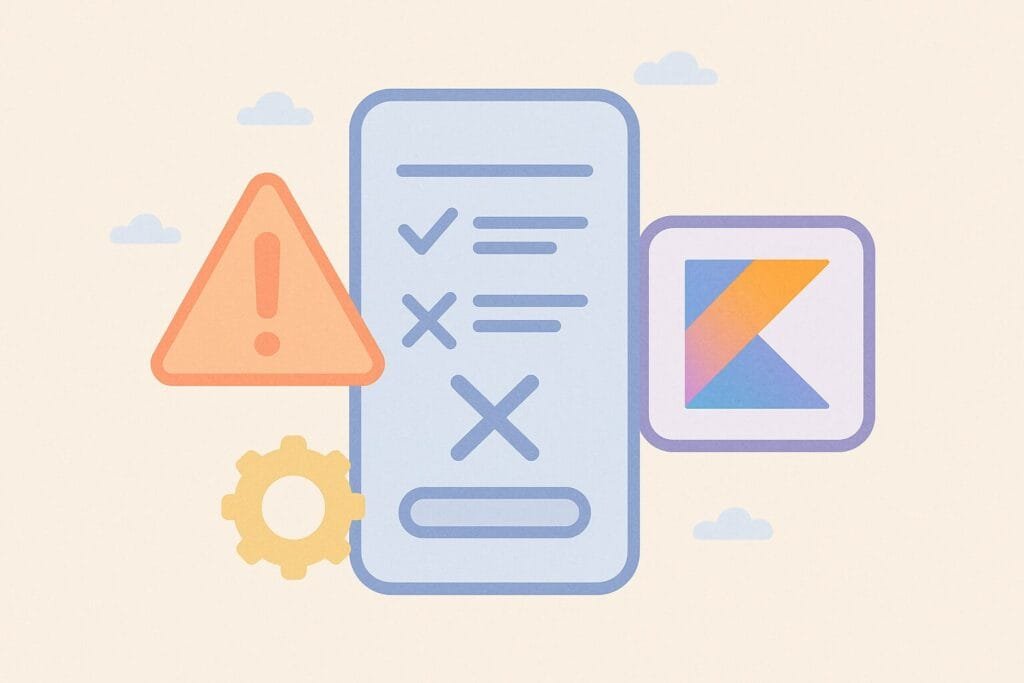If you’re building a background task in Android using Kotlin and WorkManager but find that WorkManager is not triggering, you’re not alone. This is a common issue developers face when implementing background jobs, especially when targeting Android 10 (API 29) and above. This article explores the causes, provides practical solutions, and includes a complete Kotlin code sample for implementing and debugging WorkManager.

What is WorkManager?
WorkManager is an Android Jetpack library that manages deferrable, asynchronous background tasks that need guaranteed execution. It is ideal for tasks like syncing data, uploading logs, or periodic jobs that should run even after app restarts or device reboots.
Common Reasons Why WorkManager Doesn’t Trigger
| Cause | Description |
|---|---|
| Constraints not met | Network, charging, or idle constraints are not satisfied. |
| App is in restricted background | Battery optimization restricts background jobs. |
| Incorrect WorkRequest setup | Work not enqueued properly or misconfigured. |
No @Worker implementation | Worker class not implemented correctly. |
| Testing on Emulator | Emulators may behave differently without proper battery/network simulation. |
Step-by-Step Working Solution
Here’s a full working Kotlin example using WorkManager with explanations and debugging tips:
1. Add Dependencies
dependencies {
implementation "androidx.work:work-runtime-ktx:2.9.0"
}
2. Create a Worker Class
class MyWorker(appContext: Context, workerParams: WorkerParameters) :
Worker(appContext, workerParams) {
override fun doWork(): Result {
Log.d("WorkManager", "Work triggered!")
// Your task logic here
return Result.success()
}
}
3. Enqueue the Work
val workRequest = OneTimeWorkRequestBuilder<MyWorker>()
.setConstraints(
Constraints.Builder()
.setRequiredNetworkType(NetworkType.CONNECTED)
.build()
)
.build()
WorkManager.getInstance(context).enqueue(workRequest)
4. Don’t Forget to Register the Worker in Manifest (optional)
<provider
android:name="androidx.startup.InitializationProvider"
android:authorities="${applicationId}.androidx-startup"
android:exported="false">
<meta-data
android:name="androidx.work.WorkManagerInitializer"
android:value="androidx.startup" />
</provider>
How to Debug If It’s Not Triggering
- Enable logs:
WorkManager.initialize(context, Configuration.Builder()
.setMinimumLoggingLevel(Log.DEBUG)
.build())
- Check logs:
Useadb logcatwith the tagWorkManager. - Verify constraints:
Make sure network is connected and charging state is as expected. - Disable battery optimization for testing:
Settings → Battery → App usage → Remove restrictions for your app. - Check Android Version Differences:
WorkManager behaves differently on Android 6 (Doze Mode) to Android 12+ (Foreground restrictions).
Common Mistakes and Fixes
| Problem | Fix |
|---|---|
| Work not showing logs | Use Log.d() inside doWork(), not println() |
| Work triggers only once | For repeating work, use PeriodicWorkRequest |
| App killed before work starts | Use WorkManager.getInstance().enqueueUniqueWork() with ExistingWorkPolicy.KEEP |
val periodicWork = PeriodicWorkRequestBuilder<MyWorker>(15, TimeUnit.MINUTES).build() WorkManager.getInstance(context).enqueue(periodicWork)
Avoid multiple enqueues without cancellation:
WorkManager.getInstance(context).cancelAllWorkByTag("syncTag")
Assign tags for easier tracking:
val request = OneTimeWorkRequestBuilder<MyWorker>()
.addTag("syncTag")
.build()
Real Use Case: Sync Notes to Server
Let’s say you want to sync offline notes to the server when the device is connected to Wi-Fi. Here’s how to build it:
class SyncNotesWorker(appContext: Context, params: WorkerParameters) :
Worker(appContext, params) {
override fun doWork(): Result {
val success = syncNotesToServer()
return if (success) Result.success() else Result.retry()
}
private fun syncNotesToServer(): Boolean {
// Simulate network sync
return true
}
}
Enqueue with constraints:
val workRequest = OneTimeWorkRequestBuilder<SyncNotesWorker>()
.setConstraints(
Constraints.Builder()
.setRequiredNetworkType(NetworkType.UNMETERED) // Wi-Fi only
.build()
)
.build()
WorkManager.getInstance(context).enqueue(workRequest)
Conclusion
If Kotlin WorkManager is not triggering, don’t panic. It’s often due to unmet constraints, incorrect implementation, or system restrictions. With the right setup and debugging tools, you can ensure your background tasks run reliably.
Key Takeaways:
- Always check constraints.
- Test on real device when possible.
- Avoid duplicate enqueues.
- Monitor logs for failure points.

